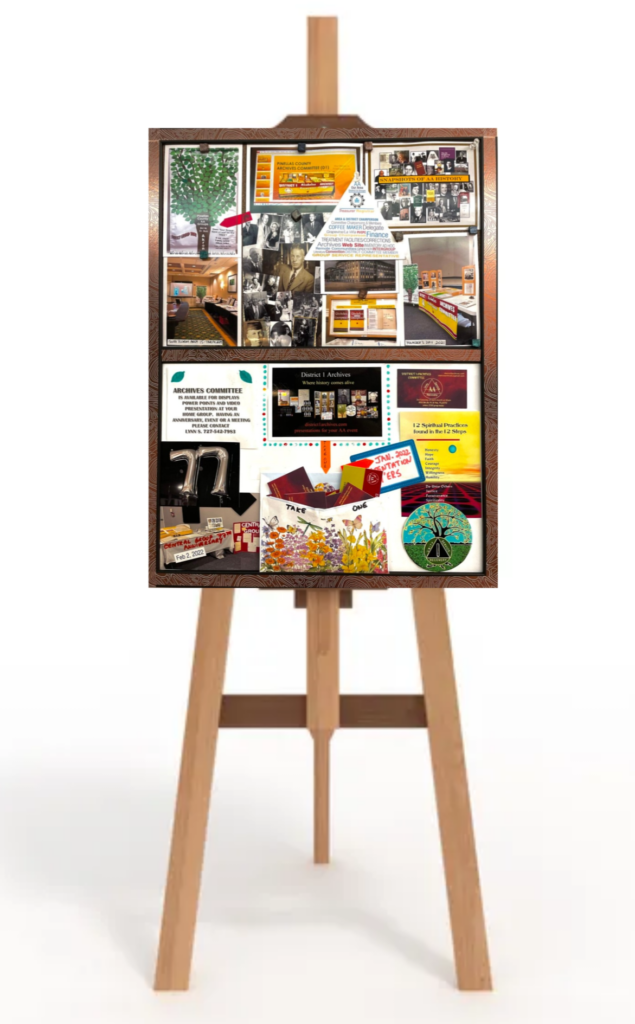The mission of the District 1 Archives Committee is to document the work of Alcoholics Anonymous by collecting and preserving historical material relating to District1.
We meet the third Saturday of every month at:
Like any other A.A. service, the primary purpose of those involved in archival work is to carry the message of Alcoholics Anonymous. Archives service work is more than mere custodial activity, it is the means by which we collect, preserve and share the rich and meaningful heritage of our fellowship. It is by the collection and sharing of these important historical elements that our collective gratitude for AA is deepened. Please remember the District One Archives Committee is available for displays at your Holiday, Event or Anniversary Meetings. Keep in mind these Archives belong to YOU and to all of the members of Pinellas County AA.

Interview Spotlight
Check out our featured interview, Jill G. of 2250 group.

District 1 Archives Committee Composition:
Archives Committee Standing Positions: Qualifications and Responsibilities.
Chair/Treasurer: The Archives Chairperson also serves as Treasurer, combining the two positions eliminates a middle person when requesting funds from District.
1. Term 2 years
2. 2 years continuous sobriety. May be waived if deemed acceptable by the Archives Committee.
3. Leads monthly Archives Committee meetings.
4. Responds to sender acknowledging receipt of email message.
5. Represents the Archives Committee at various District functions.
6. Presents reports at District and Area meetings.
7. Prepares annual budget for Archives Committee expenses.
8. Requests funds from District as needed.
Alternate Chair: Requirement same as Chair. Fills in for the Chair necessary.
Secretary: Records minutes of Committee meetings.
1. Terms 2 years
2. 2 years continuous sobriety. May be waived if deemed acceptable by the Archives Committee.
3. Maintains a roster (name, email address and phone number) of active Committee members.
4. Emails monthly meeting minutes to members in a timely manner.
5. Emails a meeting reminder to all members on the roster 4-5 days prior to next meeting.
Archivist: Responsible for the Archives collections, including documents, books, recordings and artifacts. Maintains the physical integrity of the collection and also develops an index, inventory and a practical means of searching the collection.
1. Term indefinite. Non-rotating.
2. 5 years continuous sobriety. May be waived if deemed acceptable by the Archives Committee.
3. Must have good organization skills and detailed-oriented.
4. Is responsible for organizing, updating and maintaining an inventory of materials in the collection. Arranges for the orderly removal and return of display materials.
5. Upon receipt of a donation, completes donation receipt and fulfills duties.
6. Archives digital copies of the Plain & Straight.
7. Archives digital copies of monthly Archives Committee meeting minutes.
Alternate/Assistant Archivist: Same as Archivist.
The following positions have no minimum sobriety requirement.
Plain & Straight Liaison: Submit monthly articles about A.A. history to the Plain & Straight.
Website Liaison: Maintain the District 1 Archives website; posts material as needed and post minutes monthly on website.
Biographer: Schedule and Record on CDs interviews with local long-timers. Submits recordings to Archivist.
No-Show:
If a Committee member holding a position does not attend two (2) consecutive monthly meetings, and does not communicate with the Committee, the position will be considered vacant.
Procedure:
The Committee holds meetings every 3rd Saturday of each month at 10am. The Secretary reads last month minutes, Committee standing members reads their reports. Chairperson reports and discuss accepted motion(s) submitted by D1 General Service Business meetings, discuss new business pertaining to Area 15 agendas, website adding materials and rearranging and preparing for display presentation when invited. Everyone is welcome to attend the Archives Committee meeting.
When the Archives Committee receives an invitation to do a display, it must be approved by the Committee in advance. The Archives Committee does not pay admission/registration fees to attend a function or order to do a display. However, if individual members are planning to attend and are willing to accept responsibility for the materials, an invitation may be accepted.
A traveling display may include the following:
1. One or more of the wooden tri-fold photo displays
2. A display case and binders.
3. Group family tree w/stand.
4. Binder containing Group history forms
5. District 1 Archives banner.
6. Traveling Board if appropriated to the event.
Pertaining to all displays: The material must not be left unattended. The room must be locked anytime no attendant is present. This is particularly important for large and multiple-day events, such as conventions. Adequate supervision (people to monitor things) must be arranged in advance.
District 1 Group Family Tree: For a group to be represented by a leaf on the Group Family Tree, a Group Form must be file with Archives Committee. Forms may be obtained online from the Archives website or from an Archives Committee member.
Biographer Guidelines for interview and recording members of archival files: The purpose of recording members is to memorialize the recollections of senior District 1 members with emphasis of their memories of how A.A. was practiced when they first came to District 1. We want this to be a comfortable experience for everyone involved.
1. Interview should be no more than 1 hour, after editing. Anything under that is fine, depending on who long the member wishes to speak.
2. Try to arrange a quiet location free of distractions, perhaps someone’s home.
3. Be certain that the member being interviewed read and sign the Interview Waiver Form.
4. Before you begin recording, explain to the member that our primary interest is in A.A. role in the person’s story. The emphasis should be on sobriety rather than drinking. The member may want to begin their story with their original contact with A.A.
5. Begin the recording by identifying yourself and giving the date. Then introduce the member.
6. The member may want to simply reminisce. If, however, they prefer to answer question, the Archives has prepared a list of suggested questions.
a. Sobriety date.
b. How did you get sober?
c. How did you learn about A.A.?
d. When and where are your first actual contact made with A.A.
e. Did you have a sponsor? If so, how did it help you as a newcomer?
f. Who were the people especially prominent in your sobriety?
g. Your first home group?
h. Who were the founders and group officers of early groups?
i. What special occasions do you recall? (Start a new group, assemblies, conventions, etc…)
j. Did you get into Service? If so, how deeply?
k. When was A.A. started in your original place of sobriety?
l. What was A.A. like then?
m. When did you move to District 1?
n. When you come to District 1, what difference did you see?
Archivist: Requirement for storing Archives Collection:
1. Climate controlled 24/7.
2. Pest controlled.
3. Secure.
4. Reasonable accessible.
Collection Scope: District 1 Archives acquisition priorities include, but are not limited to:
1. Group histories.
2. When and Where.
3. Local event flyers: conventions, picnics, anniversary or special meetings, new meetings, etc.
4. Relevant correspondence.
5. Written or recorded histories of long-time members.
6. District 1 General Service Business meeting minutes (forwarded annually by District Secretary).
7. Display items including:
a. Books.
b. Pamphlets.
c. Newspapers articles.
d. Photographs.
e. Group Family Tree
f. Other appropriate artifacts.
Acceptance of Donated Materials: Following are the guidelines for accepting a donation.
1. Any donation accepted commits the Committee to the task of organizing and preserving it, which involves hand work and archival material costs.
2. Any prospective donation that would require expensive conservation, special housing, intensive processing, or other extensive demand on Archives resources may not be accepted.
3. If a monetary appraisal is desired by a donor, it is recommended that is be done by a disinterested third party before title of the material is transferred to District 1 Archives.
4. District 1 Archives does not purchase archival records, books, or artifacts.
5. District 1 Archives generally does not accept items on loan.
Retention & Deaccession: District 1 Archives reserves the right to reevaluate historical material and to carefully and judiciously deaccession and dispose of certain items from its collection consistent with professionally accepted standards. An item may be deaccessioned if any of the following conditions exits:
1. In most cases, a maximum of three copies of any item will be retained.
2. The item is not relevant to Alcoholic Anonymous or to the District 1 mission and scope.
3. The item has deteriorated beyond usefulness.
4. District 1 Archives is unable to continue to provide care and storage for the object.
5. The item may be replaced with a similar object or greater significance, quality, and/or in better condition.
6. The item is subject to legal and ethical standards requiring its removal. Complete records will be maintained on all deaccessioned items and their subsequent disposition.
Disposal of Deaccessioned Items: Deaccessioned items may be disposed of by one of the following method, in decreasing order of desirability:
1. Return to original donor
2. Transfer to another Alcoholic Anonymous repository: offer to another District Archives in Area 15.
3. Donation to an appropriate non-A.A. archive or scholarly institution.
4. Destruction of the item.



